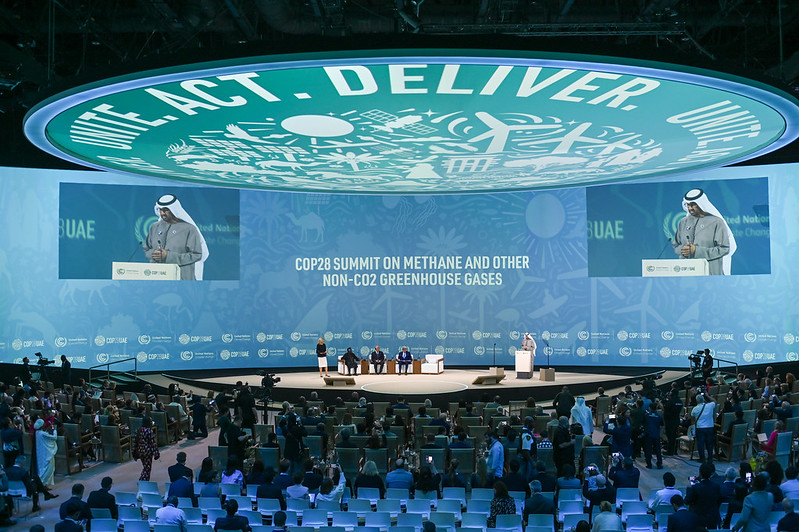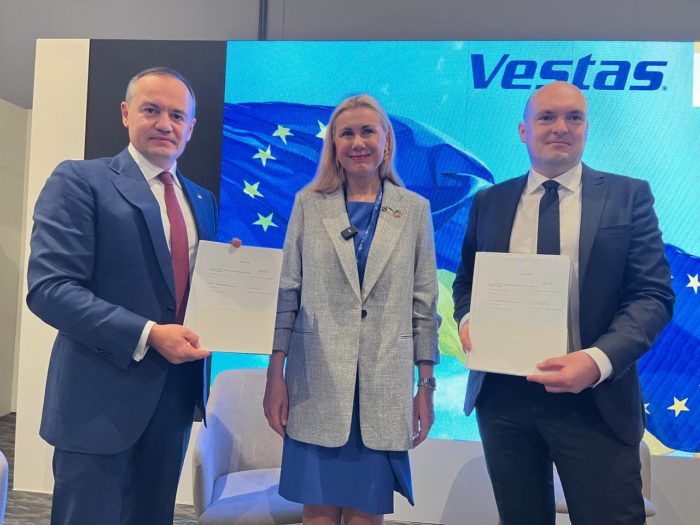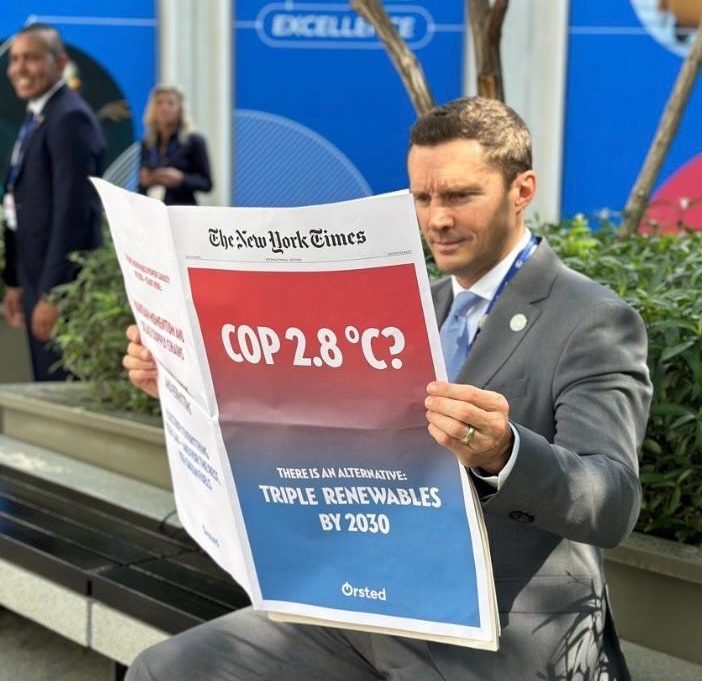Article by: Oleh Savytskyi, Razom We Stand; Anastasia Zahoruichyk, Office for the Environment; originally published in Ukrainian on Ekonomichna Pravda
Observing the UN climate conference COP28, which is currently taking place in Dubai, one can notice important geopolitical shifts: The EU and the US are consolidating the course of replacing fossil fuels, while Russia, for its part, is trying to counteract by drawing Brazil into OPEC+ and gathering oil and gas dictatorships around it.
On December 1-12, leaders and numerous delegates from around the world are gathering in the United Arab Emirates for the COP28 talks to agree on practical ways to implement the Paris Climate Agreement, which was adopted in 2015 to limit global warming to 1.5°C relative to preindustrial levels.

War and energy transition: what Ukraine brought to COP28
For the second time, Ukraine is organizing its own pavilion at the UN climate conferences, and this year, it features installations that tell about the devastating consequences of Russian aggression for the environment, as well as about the resilience and courage of Ukrainians on the path to green reconstruction of the state.
The events in the pavilion focused on Ukraine's renewable energy potential and its role in achieving Europe's sustainable development goals, green reconstruction, and long-term sustainable development, the effects of climate change in occupied Crimea, and the impact of armed conflicts on the environment.

On 4 December, a discussion was held on the key importance of the "green" transition for Ukraine, which included European Commissioner for Energy Kadri Simson, Minister of Energy Herman Halushchenko, Assistant Secretary of State for the US Bureau of Energy Resources Jeffrey Payette, and representatives of energy companies. The key message of the event was that Ukraine is striving to become a leading green energy hub in Europe by developing its own renewable energy production in partnership with the EU and the US.
"The war has shown that developing renewable energy sources is more important than just a matter of generation. It is an element of the country's energy security. And this experience that Ukraine has gained is relevant for Europe and the whole world," Halushchenko said.
Also on Monday, DTEK CEO Maksym Timchenko signed a memorandum of understanding with Danish company Vestas to expand the Tyihul wind farm project in the Mykolayiv Oblast. Its first phase was built for 200 million euros ($217 million) during the war.

The new €450 million in financing is coming from banks with state guarantees and insurance against war risks, Timchenko said, praising Denmark for its role in securing the project's financing.
The next day, on 5 December, a report on the prospects for decarbonizing Ukraine's energy sector was presented and discussed with the participation of European Commission Vice President Maroš Šefčovič, International Energy Agency Director Fatih Birol, and representatives of the World Bank and the International Finance Corporation.
At the event, Mr. Halushchenko noted that in the future, the decarbonized mix of Ukrainian electricity will consist mainly of renewable energy sources and nuclear generation. According to him, expanded electrification of other sectors and energy efficiency measures will play a key role in the broader efforts to decarbonize Ukraine's economy.
What concerns the world: key statements and events
The negotiations opened with a summit of heads of state, the World Climate Action Summit. The first leader to speak was King Charles III of the United Kingdom of Great Britain and Northern Ireland.
"We are terribly off course," said King Charles III in his emotional speech, commenting on the findings of scientists regarding the current trajectory of greenhouse gas emissions, and emphasizing our responsibility to future generations: "Our descendants will judge us not by our words but by the consequences of our actions."
In their speeches, the leaders of the European Union highlighted the successes of EU member states on the path to decarbonization and reiterated their intention to continue to help countries in need to overcome the effects of climate change and implement a green economic transformation.
"We have a 1.5-degree target, and we must get rid of our dependence on fossil fuels as soon as possible," said Charles Michel, President of the European Council.
Ursula von der Leyen, President of the European Commission, added that "global emissions are set to peak by 2025. We have to phase out fossil fuels and reduce methane emissions. The EU has already reached its peak. We have reduced emissions and are on track to exceed the target."

Where the world stands in relation to the goals of the Paris Agreement
An important outcome of COP28 should be an action plan on the document presented in September called the Global Stocktake (GST), which summarizes eight years of countries' work to achieve the goals of the Paris Agreement.
The audit, published by the UN, found that the world is not on track to curb global warming. The final version of the document is intended to help countries identify the main gaps in climate action and strengthen their commitments in the next round of Nationally Determined Contributions by 2025. However, participants are currently arguing over the final wording of the document.
The United States and other countries that have joined the Powering Past Coal Alliance believe that the global audit at COP28 should be a turning point for the start of the global coal phaseout. For their part, India and China may try to block the relevant provisions.
The EU, the US, and countries vulnerable to climate change are also advocating that the new plans should not exclude any industry and cover all greenhouse gases, not just carbon dioxide. Russia and Saudi Arabia, on the other hand, favor language that would allow for the continued use of fossil fuels.
On 5 December, the first draft of the conference decision was presented. The discussions are focused on the section on climate change mitigation, where there are three options for fossil fuel wording.
The first one is for an "orderly and equitable phaseout of fossil fuels," which is supported by Pacific Island countries. The second is to "accelerate efforts to phase out fossil fuels without capture and rapidly reduce their use to achieve net zero CO2 emissions from energy systems by around midcentury," which is generally in line with the EU's position. The third option is to avoid mentioning fossil fuels altogether.
Countries whose economies depend on oil and gas exports, such as Saudi Arabia, Russia, and Iraq, have already announced that they will not support the text if it calls for a complete phaseout of fossil fuels. The key question will be whether India and China, which previously opposed "phaseout" and insisted on "gradual reduction," will support the new proposal.
At some point, the participating countries will have to vote to adopt the document or reject it. The deadline is 12 December, the end of the conference, but discussions may drag on longer. Obviously, the issues of energy decarbonization and the abandonment of fossil fuels will be the subject of heated debate.
Abandoning coal and tripling renewable energy capacities by 2030
More than 110 countries have committed to tripling the capacity of renewable energy sources worldwide by 2030 and doubling the annual rate of energy efficiency improvements. The International Energy Agency called this decision "the most important lever" to limit carbon emissions and avoid catastrophic global warming.
The agreement, which was also supported by Ukraine, is expected to provide "clarity and predictability" to businesses and investors, and to mobilize "much-needed private capital around the world," said European Commission President Ursula von der Leyen, who was the main promoter of the deal.

On the third day of the negotiations, seven countries announced that they would join the Powering Past Coal Alliance (PPCA) and declared their support for the phaseout of coal power, including the United States, the Czech Republic, Cyprus, the Dominican Republic, Iceland, Kosovo, and Norway.
"To reach our goal of producing 100% carbon-free electricity by 2035, we need to phase out coal, and we call on the world to join us in doing so while working to create good-paying clean energy jobs," said John Kerry, the US President's climate envoy.
The day before, French President Emmanuel Macron, in his speech at the leaders' summit, called on developed countries to abandon coal by 2030 and noted that France plans to do so by 2027.
Ukraine joined the PPCA two years ago, on 04 November 2021, during COP26 in Glasgow.
At that time, this decision was widely supported by the public and international partners as one that would help eliminate the most polluting coal-fired power plants in Europe and take an important step towards decarbonizing and modernizing the country's economy.
At one of the events at the Ukraine Recovery Conference 2023 in London, Deputy Minister of Energy of Ukraine Yaroslav Demchenkov confirmed that Ukraine plans to stop using coal in the electricity sector by 2035.
At COP28, Ukraine supported the declaration on tripling the world's nuclear power capacity by 2050, initiated by the United States. Together with 23 signatory countries, Ukraine declared its intention to cooperate internationally to triple nuclear generation by 2050 compared to 2020.
Russian fossil fuels are first in line to go
The US government plans to cut Russia's oil and gas revenues in half by 2030, emphasizing the need to maintain sanctions for many years, as Geoffrey Pyatt said in an interview with the Financial Times on the eve of the COP28 opening. According to him, limiting the Kremlin's ability to make money on fossil fuel exports should ensure that Russia will never again be able to attack its neighbors.
A new analytical report published jointly by Ukrainian and international NGOs takes a broader view of this problem in the context of many countries' dependence on fossil fuels, including those from Russia.
Since the beginning of the full-scale war in Ukraine, Russia has earned more than 550 billion euros from fossil fuel exports. In 2024, the Kremlin intends to allocate almost a third of its total expenditures to the army and military-industrial complex, which will be the highest figure since the Soviet era.
The international community must take decisive action to limit exports and eventually curtail Russian fossil fuel production. The embargo's effectiveness on Russian coal shows how to strengthen international sanctions against all Russian fossil fuels.
The conclusions of the Razom We Stand report emphasize that by maintaining ties with Russian oil and gas, international energy companies, commodity traders, shipping companies, insurers, and banks continue to indirectly finance the war of aggression in Ukraine and simultaneously exacerbate the climate crisis.
Related:
- Russia earns over USD 595 billion in revenue from fossil fuel exports
- G20 host India & member states’ addiction to Russian oil prompt Ukraine snub
- G7 still feeding Russia’s war machine with fossil fuel addiction

